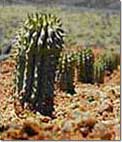|
Hoodia gordonii, "Whoo De AH", is the botanical name for a leafless, spiky succulent plant that grows throughout the semi-arid areas of Southern Africa primarily the Kalahari desert. The San (local inhabitants) have rationally used Hoodia stems to stave off hunger and thirst when on long journeys, as it acts as an appetite suppressant. Hoodia is a Succulent botanical and is part of the Genus: Trichocaulon and belongs to the Family Name: Asclepiadaceae. There are approximately twenty plants within the Hoodia genus family, however, Hoodia Gordonii is the unique plant that South African San bushmen have used for generations to endure long hunting expeditions.
After years of careful research, scientists isolated several compounds in this all-natural food that was responsible for dramatic weight loss, P57, which has been widely reported, is but one of several chemical compounds found in the Hoodia succulent. Not only was it proven completely safe, it contains no stimulates that could contribute to the jittery feeling associated with weight loss products of the last decade. Mass global interest has been shown for Hoodia since Pfizer, the international pharmaceutical giant, started to research Hoodia's potential to help people with obesity. Pfizer recently discovered Hoodia and decided to invest millions into researching the plants benefits as a new drug that would help with obesity. The research published by this company has catapulted Hoodia into the international spotlight.
In the wild Hoodia takes 5-6 years to mature but is now being cultivated in as little as 2 years commercially in sustainable quantities and has become widely known for its effects as an appetite suppressant. The Hoodia Gordonii plant originated in the southwestern part of Africa and grows best in the semi-arid areas of South Africa primarily the Kalahari. In its native habitat it is extremely difficulty to identify because it looks similar to succulents of the same family of which there are many. Only an experienced botanist or as the case in South Africa with Hoodia Gordonii a San people can identify the plant prior to it's blooming.
All over the world, people are trying to buy hoodia, and there just isn't enough supply to go around. The succulent growers have been wiped out. The seed providers have virtually no inventory left. And since hoodia takes more than six years to grow to harvesting height, there's going to continue to be a great hoodia shortage until at least 2010, maybe beyond. Hoodia is also known by horticulture experts as being extremely difficult to cultivate in captivity. The plants rot easily, and they won't grow in regular soil -- they need sandy soil with excellent drainage. Also, to make things even more difficult, these plants aren't pollinated by bees, they're pollinated by flies. To attract the flies, their blooms emit a strong, repulsive odor that smells a lot like rotting flesh. To make matters even more challenging, Hoodia grown in South Africa under the San tribe's influence is required to be grown under organic conditions. That means they can't use pesticides. Entire crops have been known to vanish virtually overnight thanks to the ravages of various insects.
The Hoodia is an all-natural, herbal dietary supplement and there are no know adverse side effects relating to its use. No Caffeine. No Ephedra. So Hoodia is safe for us. There are no known reported side effects to using Hoodia Gordonii that have been reported to date. Hoodia was eaten as a fresh food by the San tribe for thousands of years with zero side effects. There are no known adverse side effects as a result of taking Hoodia in conjunction with prescription medications and other herbal supplements. However, if you are presently using any prescription medication and are under the care of a physician, you should always consult your physician before taking any supplement medication.

|